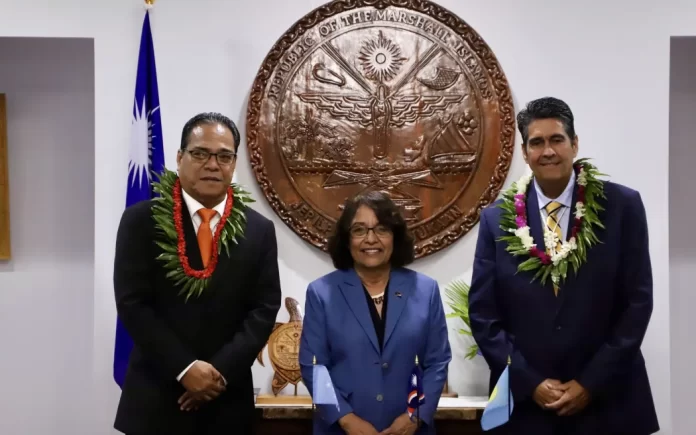The renewal of close U.S ties with Micronesia, Palau and the Marshall Islands will contribute to greater regional security, island leaders said after President Joe Biden signed a government funding bill into law that included US$7.1 billion for the three Pacific allies.
Biden’s signature on Saturday following the passage of the US$460 billion bill through Congress last week averted a partial government shutdown. It also ended uncertainty about funding for the three Micronesian nations that occupy a swath of the western Pacific crucial to U.S military dominance in the region.
“The path to this day has been longer than expected and a challenging road that raised concerns,” Federated States of Micronesia President Wesley Simina said in a video posted online Sunday.
“At the end of the day, the FSM and the U.S. reached an agreement with an outcome that I am confident will benefit both our nations and contribute to greater peace and prosperity for our peoples and to greater security and stability for the Indo-Pacific region and the world,” he said.
The Marshall Islands, Micronesia and Palau, which together are home to about 200,000 people, give the U.S. military access to their vast ocean territories in exchange for funding and the right for their citizens to live and work in the U.S.
The office of Palau President Surangel Whipps Jr said it was “wonderful news”. The legislation includes US$889 million for Palau, officials said in a statement.
The agreements, known as compacts of free association, also allow the U.S to deny other countries access to the waters between the Philippines and Hawaii.
Amid increased U.S-China rivalry in the Pacific, the three island nations last year signed new economic assistance agreements with the U.S that are significantly more generous and provide a total of US$7.1 billion over two decades. But budget battles between Republicans and Democrats created uncertainty about when the funding taps would be turned on.
The leaders of Palau, Micronesia and the Marshall Islands, the New Zealand and Australian ambassadors to the U.S and dozens of U.S politicians had recently rung alarm bells that delays in securing the funding had created an opening for China’s government to further increase its influence in the region.
Marshall Islands President Hilda Heine said the Nitijela – the Marshall Islands legislature – still needs to give its approval for the updated compact, which includes US$700 million in contributions over four years to a national trust fund.
The Marshall Islands was the last of the three nations to sign its amended compact with the U.S last year after negotiations complicated by the legacy of American nuclear testing on Bikini and Enewetak atolls in the 1940s and 1950s.
U.S legislative approval “represents a very big step in our mutual and enduring efforts to strengthen the compacts,” Heine said in a statement.
The compact, she said, “is crucial to the wellbeing of our citizens and security of our region.”
The Marshall Islands hosts a mainstay U.S ballistic missile testing and space surveillance range on Kwajalein Atoll. In Palau, the U.S military is building an over-the-horizon radar station.
Last month, Simina and the leaders of Palau and Marshall Islands had warned in a letter to senior U.S legislators that uncertainty about funding had “resulted in undesirable opportunities for economic exploitation by competitive political actors active in the Pacific.”
The letter didn’t name China but its inroads with Pacific island nations, including a security pact with the Solomon Islands in 2022, have recently galvanized renewed U.S attention to the region.
China’s government has courted Pacific island nations for several decades as it seeks to isolate Taiwan diplomatically, gain allies in international institutions and erode U.S.dominance. Beijing regards Taiwan, a democracy and globally important .














